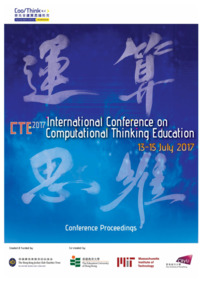International Conference on Computational Thinking EducationHong-Kong, 13.-15.07.2017
|

|
 Diese Seite wurde seit 1 Jahr inhaltlich nicht mehr aktualisiert.
Unter Umständen ist sie nicht mehr aktuell.
Diese Seite wurde seit 1 Jahr inhaltlich nicht mehr aktualisiert.
Unter Umständen ist sie nicht mehr aktuell.
 Zusammenfassungen
Zusammenfassungen
 International Conference on Computational Thinking Education 2017 (CTE2017) is the first
international conference organized by CoolThink@JC, created and funded by The Hong Kong Jockey
Club Charities Trust, and co-created by The Education University of Hong Kong, Massachusetts
Institute of Technology, and City University of Hong Kong.
International Conference on Computational Thinking Education 2017 (CTE2017) is the first
international conference organized by CoolThink@JC, created and funded by The Hong Kong Jockey
Club Charities Trust, and co-created by The Education University of Hong Kong, Massachusetts
Institute of Technology, and City University of Hong Kong.CoolThink@JC strives to inspire students to apply digital creativity in their daily lives and prepare them to tackle future challenges in any fields. Computational thinking (CT) is considered as an indispensable capability to empower students to move beyond mere technology consumption and into problem-solving, creation and innovation. This 4-year initiative educated over 16,500 upper primary students at 32 schools on computational thinking through coding education. Moreover, through intensive professional training, the Initiative develops the teaching capacity of 100 local teachers and helps them master the coding and computational thinking pedagogy. Over time the project teams target to affect greater change by sharing insights and curricular materials with policymakers and educators in Hong Kong.
“Computational Thinking Education” is the main theme of CTE2017 which aims to keep abreast of the latest development of how to facilitate students’ CT abilities, and disseminate findings and outcomes on the implementation of CT development in school education. It comprises keynote and invited speeches by internationally renowned scholars, panel discussions, academic paper presentation, booth exhibition on STEM/Coding products and solutions, and student and teacher poster presentation and demonstration.
 Kapitel
Kapitel 
- Assessing Students’ Computational Thinking in a Learning by Modeling Environment (Seite 11 - 16) (Ningyu Zhang, Gautam Biswas)

- Computational Thinking as a Key Competence - a Research Concept (Seite 103 - 106) (Amelie Labusch, Birgit Eickelmann)

 Dieser Konferenz-Band erwähnt ...
Dieser Konferenz-Band erwähnt ...
 Dieser Konferenz-Band erwähnt vermutlich nicht ...
Dieser Konferenz-Band erwähnt vermutlich nicht ... 
 Nicht erwähnte Begriffe | AgentCubes, Digitalisierung, Informatik-Didaktik, Informatik-Unterricht (Fachinformatik), Kinder, LehrerIn, Lernen, Schweiz, Unterricht |
 Tagcloud
Tagcloud
 Zitationsgraph
Zitationsgraph
 Zitationsgraph (Beta-Test mit vis.js)
Zitationsgraph (Beta-Test mit vis.js)
 Zeitleiste
Zeitleiste
 8 Erwähnungen
8 Erwähnungen 
- Proceedings of the 14th Workshop in Primary and Secondary Computing Education, WiPSCE 2019, Glasgow, Scotland, UK, October 23-25, 2019 (2019)
- Cognitive Correlates of Computational Thinking - Evaluation of a Blended Unplugged/Plugged-In Course (Katerina Tsarava, Luzia Leifheit, Manuel Ninaus, Marcos Román-González, Martin V. Butz, Jessika Golle, Ulrich Trautwein, Korbinian Moeller) (2019)


- Cognitive Correlates of Computational Thinking - Evaluation of a Blended Unplugged/Plugged-In Course (Katerina Tsarava, Luzia Leifheit, Manuel Ninaus, Marcos Román-González, Martin V. Butz, Jessika Golle, Ulrich Trautwein, Korbinian Moeller) (2019)
- ICER 2020 - International Computing Education Research Conference, Virtual Event, New Zealand, August 10-12, 2020 (Anthony V. Robins, Adon Moskal, Amy J. Ko, Renée McCauley) (2020)
- Analyzing Viscuit Programs Crafted by Kindergarten Children (Takeshi Watanabe, Yuriko Nakayama, Yasunori Harada, Yasushi Kuno) (2020)


- Analyzing Viscuit Programs Crafted by Kindergarten Children (Takeshi Watanabe, Yuriko Nakayama, Yasunori Harada, Yasushi Kuno) (2020)
- Informatik für alle - Beitrag und exemplarische Ausgestaltung informatischer Bildung als Grundlage für Bildung in der digitalen Transformation (Stefan Seegerer) (2021)


- Vorstellungen von Lernenden zum Aufbau von Informatiksystemen - eine multimethodische Untersuchung von Lernvoraussetzungen zum Denken in Teilen von Ganzen (Nils Pancratz) (2021)


- Computational Thinking in Education - A Pedagogical Perspective (Aman Yadav, Ulf Dalvad Berthelsen) (2021)

- 2. Computational Thinking Today (Shuchi Grover)
- 8. Professional Development as a Bridge between Teacher Competencies and Computational Thinking Integration (Secil Caskurlu, Aman Yadav, Kyle Dunbar, Rafi Santo)
- Informatics in Schools. A Step Beyond Digital Education - 15th International Conference on Informatics in Schools: Situation, Evolution, and Perspectives, ISSEP 2022, Vienna, Austria, September 26–28, 2022 (Andreas Bollin, Gerald Futschek) (2022)


- Assessing Computational Thinking - The Relation of Different Assessment Instruments and Learning Tools (Vaida Masiulionytė-Dagienė, Tatjana Jevsikova)


- Assessing Computational Thinking - The Relation of Different Assessment Instruments and Learning Tools (Vaida Masiulionytė-Dagienė, Tatjana Jevsikova)
- Teaching Coding in K-12 Schools - Research and Application (Therese Keane, Andrew Fluck) (2023)


 Co-zitierte Bücher
Co-zitierte Bücher

Developing Computational Thinking in Compulsory Education
Implications for policy and practice
(Stefania Bocconi, Augusto Chioccariello, Giuliana Dettori, Anusca Ferrari, Katja Engelhardt) (2016)


Von Datenmanagement zu Data Literacy
Informatikdidaktische Aufarbeitung des Gegenstandsbereichs Daten für den allgemeinbildenden Schulunterricht
(Andreas Grillenberger) (2019)

 Volltext dieses Dokuments
Volltext dieses Dokuments
 |  International Conference on Computational Thinking Education: Gesamtes Buch als Volltext ( International Conference on Computational Thinking Education: Gesamtes Buch als Volltext ( : :  , 6434 kByte; , 6434 kByte;  : :  2021-03-21) 2021-03-21) |
 | Assessing Students’ Computational Thinking in a Learning by Modeling Environment: Kapitel als Volltext ( : :  , 201 kByte) , 201 kByte) |
 | Computational Thinking as a Key Competence: Kapitel als Volltext ( : :  , 123 kByte) , 123 kByte) |
 Anderswo suchen
Anderswo suchen 
 Beat und diese Konferenz-Proceedings
Beat und diese Konferenz-Proceedings
Beat hat diese Konferenz-Proceedings während seiner Zeit am Institut für Medien und Schule (IMS) ins Biblionetz aufgenommen. Beat besitzt kein physisches, aber ein digitales Exemplar. Eine digitale Version ist auf dem Internet verfügbar (s.o.). Es gibt bisher nur wenige Objekte im Biblionetz, die dieses Werk zitieren.








 design thinking
design thinking ICILS
ICILS Innovation
Innovation Kreativität
Kreativität Schule
Schule







 Biblionetz-History
Biblionetz-History